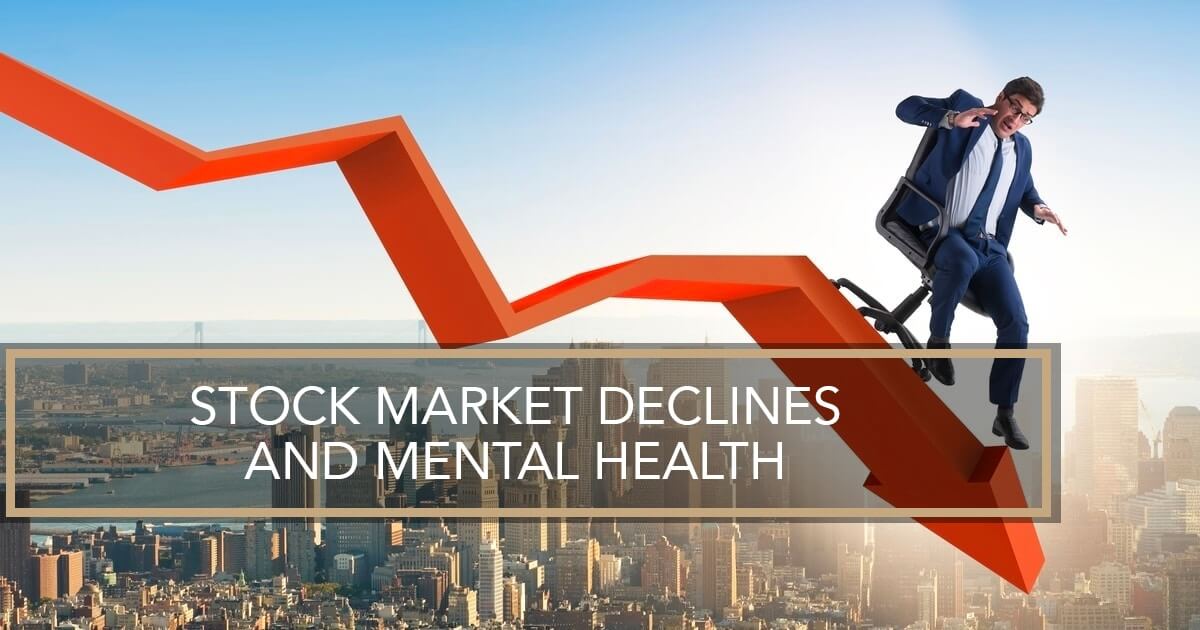When people begin to ask, “is a recession coming?” it’s natural to feel nervous. Financial health plays a role in well-being, as a job loss, steep inflation, and other factors can bring stress and lead to issues like food insecurity. A turbulent stock market and other economic factors can become more than a simple worry for some people. Read on to learn more about the connection between the economy, the stock market, and mental health.
Financial Stress & Mental Health
Throughout history, patterns of recession and depression in the economy have been marked by periods of declining happiness. Each year, Gallup conducts a survey called “Mood of the Nation,” where the organization asks questions to explore happiness and other areas of mental health. The lowest reading ever was 73 percent. Gallup received those results in July 1979 during the oil crisis that led to steep gasoline prices and inflation. Numbers also dropped in 1987 and 2008, when there were major stock market decline trends.
For investors, a market dip can be even more dramatic. Mental health and the stock market are already inextricably intertwined. Some economists and psychologists study a field called behavioral finance to explore how emotional and cognitive patterns impact trading habits. People who have money riding on the performance of a system they have no control over may suffer from extreme stress levels.
What Is Financial Anxiety?
Financial anxiety is a mental health condition marked by extreme worry over money. It can arise due to an economic downturn, job loss, or high debt levels. However, the condition can also affect people who are not experiencing financial hardship. Individuals with a lack of personal finance education or who developed specific ideas about money during childhood may also suffer from financial anxiety.
Stock market anxiety is a closely related disorder where people experience extreme worry over stock market trends. Interestingly, scientific research has shown that the problem doesn’t just occur when stock prices fall. One study in China showed that times of market volatility when stock prices continuously rose and fell even by small amounts led to increased rates of depression and anxiety among investors.
Symptoms of Financial and Stock Market Anxiety Syndrome
Financial and stock market anxiety syndrome is a mental health problem, but it can cause physical symptoms, including:
- Loss of appetite
- Insomnia
- Difficulty concentrating
- Indigestion, diarrhea, and nausea
- Headaches
- Muscle aches
- Irritability
- Restlessness
- Chest pain
- Racing heart
- Rise in blood pressure
Effects of Financial and Stock Market Stress
During financial and stock market stress, people may resort to various coping methods. Often, these coping techniques aren’t conscious decisions. A person may not realize that they are doing one thing to minimize or mask their feelings of the stock market and financial stress. Some behaviors common among people with financial anxiety include:
- Substance use: Drugs and alcohol can provide a temporary release from feelings of anxiety. However, misusing drugs and drinking large amounts of alcohol doesn’t resolve the anxiety symptoms. This can lead people to seek out a substance, get relief, symptoms returning, and a desire to use the substance again. The physical dependence on the substance can develop, making it even more difficult for people to give up drugs or alcohol.
- Overspending: Buying something can provide a temporary high. Even financially struggling people may chase that feeling, draining their bank accounts or racking up credit card debt in the process.
- Hoarding: A concern over food insecurity or financial instability can lead people to stock up on goods. For some, the habit becomes an obsession. When uncontrolled, hoarding can make a home environment unsafe and unsanitary.
- Spending and saving obsessions: Financial anxiety leads some people to control their spending to the point that they go without necessities like medical care and food to save money. It can also cause people to overwork themselves by not taking days off or picking up extra shifts or secondary employment. Working more may increase stress, worsening the fear of spending.
What To Do if You’re Struggling with Mental Health
If economic conditions affect your mental health, you don’t have to resign yourself to what you’re experiencing. Financial anxiety is an actual condition and nothing to be ashamed of. Seeking mental health treatment from a licensed counselor, therapist or psychologist can make a big difference. A mental health professional may also refer you to a psychiatrist who can prescribe medications to ease anxiety symptoms. At the same time, you learn to cope with financial uncertainty and stress through therapy.
Individuals who turn to drugs and alcohol to cope with financial stress can benefit from substance use disorder treatment. A program that also provides secondary treatment for mental health concerns like The Dunes offers makes it possible to explore how financial anxiety and addiction are interconnected and develop strategies to break out of the cycle of addiction and better manage stress.








